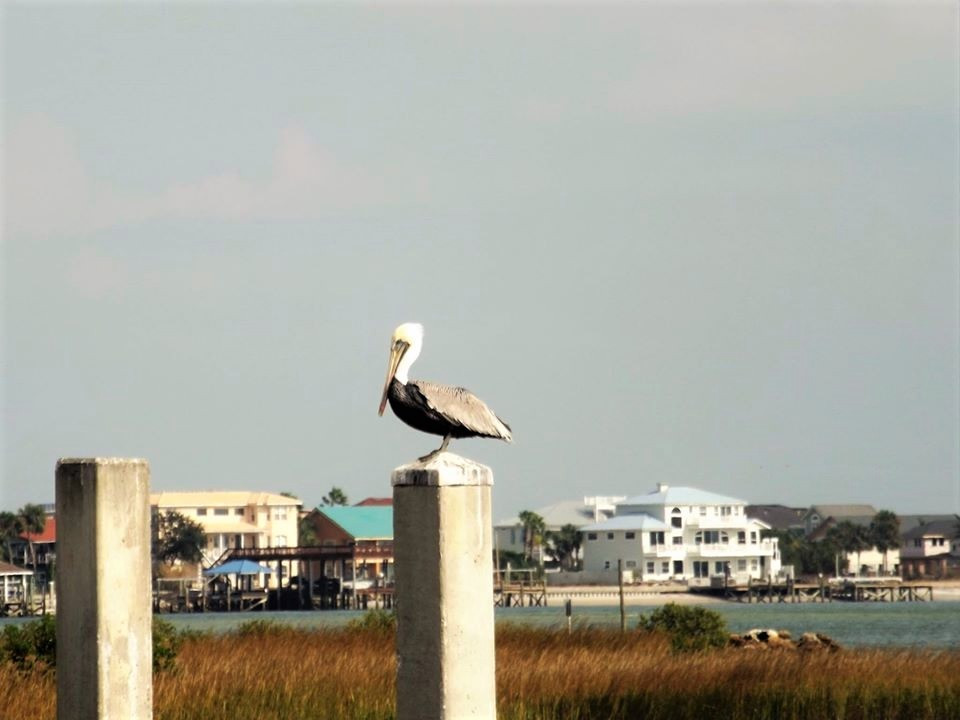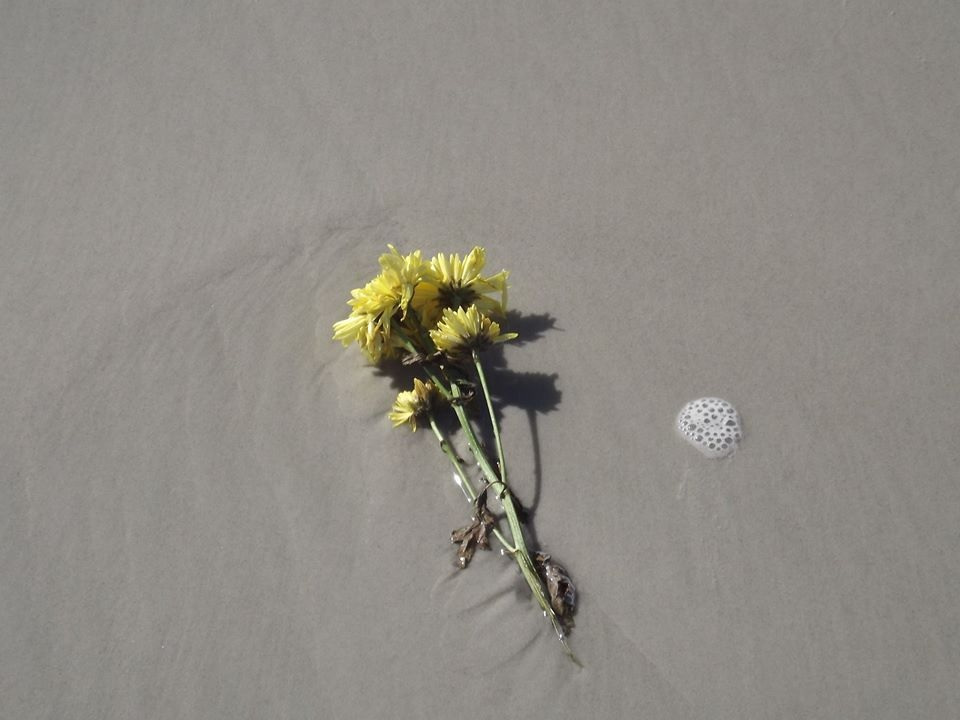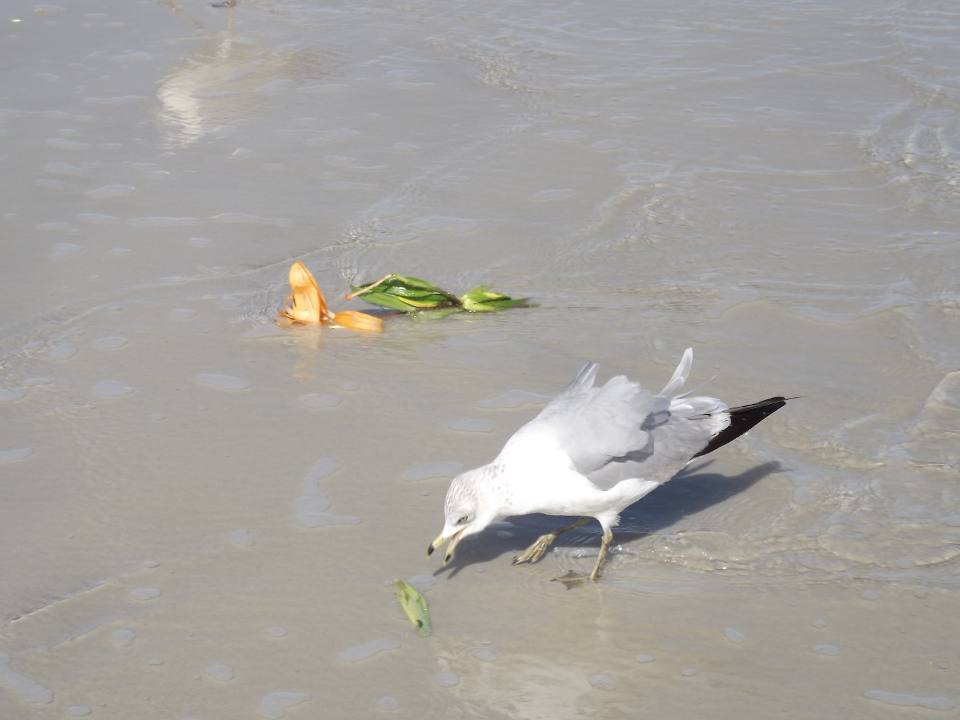Wendy Thornton
Blessing of the Birds
The day the legal guardian for my friend Jodi called and told me that she had died suddenly, I completely lost it. She died on December 23, two days before Christmas. No one knew why she died—her heart just stopped suddenly. Her guardian said the assisted living facility where she lived wanted to know if I could come get her ashes and possessions. I agreed to do so and then hung up and screamed. I could barely tell my husband what had happened.
I am responsible for “disposing” of my friend, Jodi. She always loved the beach, and after discussions with the guardian and her distant relatives, I decide to take her from our home in Gainesville, Florida, to the oldest city in the United States, St. Augustine. This go-to destination, an hour and a half away, was our favorite getaway for most of the time we knew each other. I hope she will feel at peace there.
I read up on whether it’s legal to dispose of ashes in a state park; the results are basically, “It’s better to ask for forgiveness than permission.”
Jodi has been given to me as ashes inside a plastic bag closed with a twist tie inside a cardboard box. The package is heavy, the weight of a small bowling ball. It will be complicated to dispose of so many ashes.
On Martin Luther King’s birthday, a month after her death and on a day I can easily remember, I put the life of my friend in my van, along with all of her possessions: one plastic container a little bigger than a shoebox, and one cardboard box.
As I’m packing the car, it occurs to me that I have vases full of flowers all over the house, left over from a New Year’s party. I could put the flowers in with the ashes and it would look like I’m just disposing of old flowers. Maybe that would distract any observers from knowing what I was doing.
I put the vases full of flowers into the back of my van, but as I close the back door of the vehicle, one of the vases slides out and crashes to the ground, breaking the bottom. Frustrated, I pick it up and, not knowing what else to do, stick it back in the car. As I do so, my eye catches a bird on a wire above me—a cardinal.
Now, I am trying hard to not be sentimental here. I am on a mission—disposing of my friend’s ashes—and I am not going to be distracted by some stupid bird. But my mother, who died in September, always loved cardinals. There is a saying that “cardinals appear when angels are near,” and this cardinal stays right there above me as I finish loading the van with my ice chest, purse, coffee—all the things I need to get to the beach. Even when I close the door to the vehicle, the bird continues to sit there, watching. I try not to be superstitious, but irrational or not, I find this comforting.
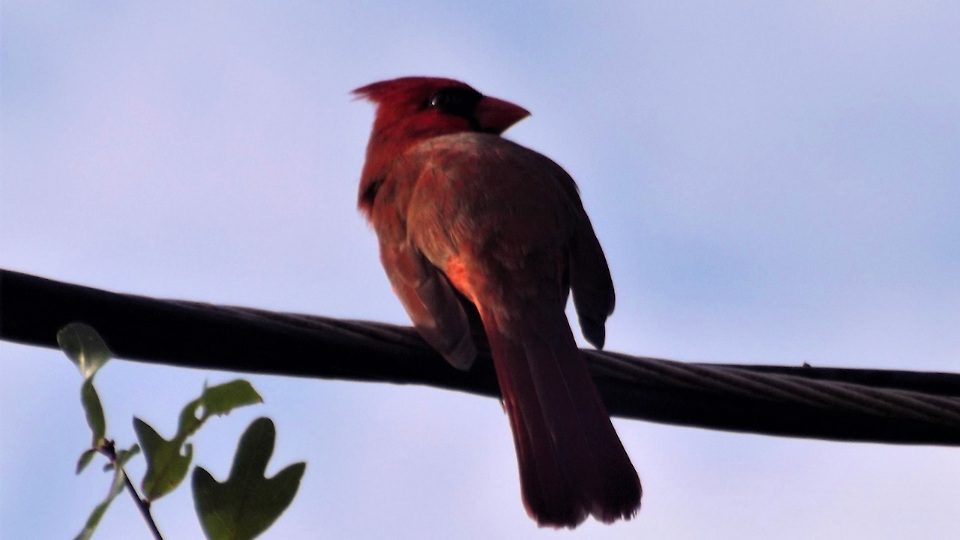
Of course, I cry all the way to the beach. Jodi and I have been friends since 1972. I met her soon after I came to Gainesville to attend the University of Florida. She had virtually no relatives—her parents both died of cancer when she was a teenager—and I had a large, loving family. She would never join me at family events, but we celebrated Christmas, New Year’s, and other holidays together every year before I went home. When I got married, she was my maid of honor. I had a child, divorced, married and had another child.
Jodi, meanwhile, dated hundreds of men. She never married, though her parade of boyfriends was never-ending, and several asked her to marry. She just couldn’t commit. I didn’t understand this, but at times I was also jealous of her lovely freedom. I never knew that for a long time, she was jealous of my life, too.
Seagulls
For many years, Jodi and I did everything together. She was my freedom; I was her rock. In 1999, at 50 years of age, Jodi collapsed on the job at the University of Florida Department of Housing, and her office mate panicked. Instead of calling 911, she ran inside for help. The person who came knew CPR, but knowing CPR and seeing a person blue on the floor are two different things. When the campus police finally showed up, they declared her clinically dead. I was told that she would never come out of her coma. When I found Jodi’s long-lost cousin, Vera, she issued a Do Not Resuscitate order, and we waited for Jodi to die.
Only she didn’t. Like a little baby bird, she came slowly back to life. She had to learn how to do everything again: feed herself, dress herself, clean herself. Because her brain had been deprived of oxygen for so long, she was initially like a toddler. She could talk, but sometimes she didn’t make sense. She went into multiple rehab centers, where she learned to dress herself, put on shoes, brush her hair. But she would forget that she needed to do so.
Eventually, I became her legal guardian. I tried to transition her back into her home, but soon it became clear that she couldn’t live alone. I came over one day, and she was sitting on the front porch in nothing but a pair of panties. When I asked her why she wasn’t dressed, she said she was doing laundry. Her many old boyfriends came by to see her, and I knew she was sleeping with them. But when they weren’t there, she forgot to eat, shower, or care for herself. Finally, reluctantly, I moved her out of her home for her own safety.
She moved into a continuing care center where she could still live alone but had 24-hour care-givers available in nearby buildings when needed. After a while, I found I could no longer be her guardian—I myself got very sick—and had to turn her care over to a professional. But we stayed close. I picked her up from her care center and took her to the beach every chance I could. But she was still not taking care of herself and going downhill mentally. Her new court-appointed guardian decided freedom was not what she needed, and had her moved to a rehab center where she would have constant, in-house care.
At first, Jodi was furious. The new place, in Jennings, Florida was a two-hour drive from my home, which meant that I couldn’t visit as much as I wanted. Jodi hated being so far away from me and from her old boyfriends. But after a while she seemed to settle in, as much as she had anywhere.
Jodi always seemed lost. She always seemed confused about why she was here, there or anywhere. A diehard atheist, she went out of her way to be wild and crazy, to be at Party Central, wherever that was. For me, an old-fashioned do-gooder, being around such an uninhibited person was a great boon. She took me places I never thought I would go, to secret concerts in the fields around Gainesville where we saw Tom Petty, Bo Diddley, Don Felder, among other musicians. We went to edgy plays by student playwrights in warehouses. And always, when we had a day off, we traveled back and forth to the beach, a place where Jodi seemed happiest. When we were young, we got golden tans every year. As we got older, we still spent hours on the beach under our umbrellas. Whenever I picked her up from the rehab center in Jennings to bring her to my home for a few days, she always said, “Can we go to the beach first?”
I had arranged to pick her up the day after Christmas and promised to take her to our favorite place, St. Augustine. So, when she died suddenly – oh so suddenly – I made up my mind I would take her to the beach regardless.
Once I got to Butler Beach, just off A1A, I parked and opened the back of the van. I felt very strange and furtive, avoiding the glances of fellow beach goers in the parking lot. As they gathered their umbrellas and ice chests to head out to the beach, I put on rubber gloves and filled up a vase with ashes and flowers. Then I walked down the beach, camera around my neck, and looked for a place where no one was swimming. The water was frigid so this wasn’t a big problem. Except for the crazy surfers, who never let freezing temperatures stop them from their obsession, the coast was clear.
I leaned down and put the opening of the vase into the water and shook the flowers out. The ashes wouldn’t come out so I shook the vase again. Nothing. The vase had been wet when I put the ashes in so now they were clinging to the side. Duh. I took off my shoes and socks, waded into the freezing water and let the waves clear out the flowers and the ashes. Now people were staring. The flowers came back to shore, and Jodi’s ashes rolled out into the softly churning water—then, unbelievably, drifted back to shore.
This was not working out the way I’d planned. I would have to push the ashes further into the ocean, so I waded out—smack into a flock of seagulls. I began to take pictures of the seagulls and the flowers, and the people on the beach began to look away, thank God. The seagulls didn’t go away, though. They huddled around me, apparently waiting for food. I had a moment of panic thinking they would pull the ashes out of the water, but apparently they weren’t into recycling.
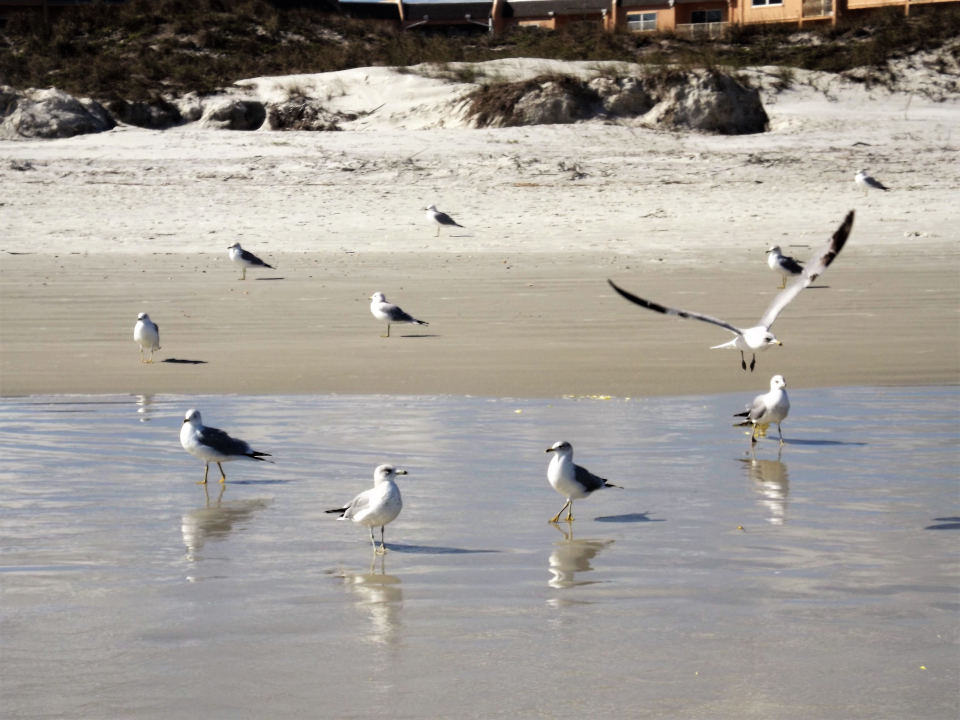
Pelicans
Afterwards, I walked up the beach with my sunglasses on, wailing silently. When I got back to the van, I sat in the back seat with the doors open and listened to the sound of the waves rolling in and out. I looked through the plastic box that held Jodi’s belongings. Inside, she had dozens of cards, some from me, some from her many boyfriends, some from close friends, some from friends who had abandoned her over the years. Jodi kept every card I’d ever sent her. She kept short stories I had written on a typewriter in the 1980s. She kept her diary entries, stories about the men who had loved, tormented and abandoned her.
Two letters in particular made me feel terrible. One, from the late sixties, was from her mother, who complained bitterly about her sexual exploits. Her mom suggested she see a psychiatrist. The letter seemed mean, sad and judgmental, and must have been written right before the poor woman died. What a legacy.
I remembered my own mother’s disappointment when I was just starting college and had moved in with a boy I barely knew. I remembered how she put her disappointment aside when she met him, how she was polite and even sweet to him. The letter from Jodi’s mother must have broken Jodi’s heart. She never talked about her mother, and now I knew why.
One other letter was from me, a letter I’d written while I was still her guardian and she’d been casually spending money she didn’t have. One month, when I ended up spending $1,500 of my own money on her necessary medication, I lost my temper. I wrote her a letter saying she couldn’t just randomly waste money she didn’t have, that even after a lifetime of hard work, she was completely broke and I was responsible for everything she spent. And that letter she kept. All those years.
After that, I couldn’t read any more. I couldn’t even look in the cardboard box. The plastic bag was still three quarters full of ashes in the back of my van—so much left to go. This was pathetic. I needed to get it over with.
I drove to the other side of town, across the bridge to the tiny town of Vilano Beach. Vilano had suffered serious damage in 2016 as Hurricane Matthew swept up the east coast. That hurricane had kept Jodi and me from one of our planned beach visits. I thought dumping her ashes where Matthew caused such destruction would be a nice slap in the face to the storm that kept us from our favorite place one last time before she left this mortal coil.
I pulled up at a restaurant on the Intracoastal Waterway. The sun was shining, sailboats passed on the horizon, the sky was blue as a painted mirror. This time I didn’t even pretend. I dumped the vases full of flowers off a dock into the water just outside of a restaurant we used to go to, and then I dumped the ashes right next to them. I could feel people in the restaurant staring at me. I watched the flowers float away, and then watched the dark stain of the ashes join them. I jumped back into my car and drove off.
As I did, a flock of pelicans swung by. Now, I should point out here that pelicans are my totem. According to Webster, a totem is:
- 1a : an object (such as an animal or plant) serving as the emblem of a family or clan and often as a reminder of its ancestry;
- also : a usually carved or painted representation of such an object
- b : a family or clan identified by a common totemic object
- 2 : one that serves as an emblem or revered symbol (https://www.merriam-webster.com/dictionary/totem)
I chose the pelican as my personal totem because they remind me of me—totally klutzy on land, totally at home in the water, totally peaceful in the sky. Like the other totems that had come before—the cardinal for my mother, the seagulls for Jodi—these birds made me feel like there was something more to this journey than just scattering raw gray matter. The pelicans wheeled and swerved above my head as I turned onto A1A to go home.
I tried not to be too sentimental. Jodi had always insisted that there was nothing after life, that there was no god, that there were no special spiritual moments, that we should live for the day. I tried to respect her beliefs as I drove up the beach road where we had spent so many magical moments.
A few minutes later, I crossed the bridge that spanned the Intracoastal, heading back to my home in the middle of the state. At just about the time Jodi’s ashes would be passing through the waters on their way to the ocean, the pelicans flew by again, and they made me feel so much better, as if somehow this journey had been worth it. As if maybe, after all she’d been through, Jodi was at peace. Finally.
